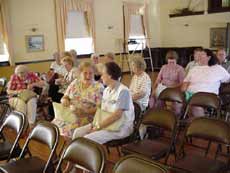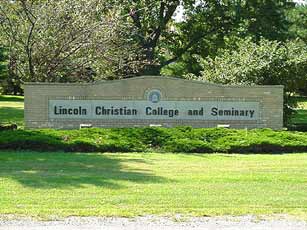|
The
Lincoln Womanís Club works hard to be proactive against woman and
child abuse, because they believe that thereís "a safe place for
every child."
During
the brief meeting, Durbin briefly discussed the convention and
campaign, and then focused on campaign issues. He ended the
meeting by answering questions, and chatting with the attendees.
Durbin flew to the Democratic National Convention in Los Angeles.
He said that in only four days, he and his companions put 900 miles on
the rental car simply by driving back and forth between the different
events! Since then, he has spent at least three days with the
Gore/Leiberman campaign in Illinois. He believes that Illinois
will see a lot of both presidential candidates, because Illinois is a
key state. Every president that has won has had the state of
Illinois.

The
senator then discussed four main issues that he stands for.
First, he said that we need a new farm bill. Many farmers are
struggling because they must compete with farmers in Brazil and
Argentina. These foreign farmers are keeping the prices of corn
and soybeans low. As a side note, the senator said that Peoria,
Decatur and Springfield have observed that the Illinois River is
silting up.

Next, Durbin focused on prescription drugs and Medicare, stating
that one-third of seniors do not have drug coverage and another
one-third do not have enough coverage. If seniors are unable to
get their medications and have to go to the emergency room, the
taxpayer pays for the treatmentóso why not prevent the emergency
room bills by just paying for the seniorís drugs.
Durbinís third issue concerned a patientís bill of rights.
He cited two stories where the insurance company refused the
doctorís orders. One doctor ignored the insurance company, and
the other doctor sent a patient home, telling him to return in a month
if there was trouble.

The
last issue concerned how to spend the tax surplus. Durbin does not believe in returning these monies to the
taxpayer
but rather using these monies for other projects. The primary
goal should be to pay off the national debt. In addition to the
debt, Durbin wants the surplus to help fund Medicare, Social Security and college educations. He also believes in tax
breaks for parents who use day care, stay-at-home moms and for older
children who care for their senior parents.
(To top of second
column in this article)
|

The
first question fielded by Durbin concerned the death tax.
Durbin answered that family farms and small businesses
should be exempt from the tax.
One
woman asked about the government pension upset where a couple that
receiving two federal government pensions is penalized.
Durbin emphatically agreed that the system needs to be
changed.

Another
individual asked the senator to what degree the public should hold
drug companies accountable. The
senator mentioned an interesting fact concerning the price of a drug
if it is prescribed for a person or an animal. There
are some instances in which a prescription for an animal is only 10
percent of what it would cost if it were for a human. The
senator does
believe that the drug companies deserve to make a profit, but he also
believes that they spend too much on advertising,
implying that if those costs were reduced, so could the cost of
their drugs. He said that
some drugs which at one time increased prices one time a year, now
increase prices every six weeks.
Durbin believes that price caps need to be set on
drugs, and then the government should negotiate prices with the drug
companies for Medicare patients.
One
man asked the senator if he believes in working with Cuba.
Durbin said yes. He
has noticed that our unwillingness to sell food and medicine to Cuba
has never forced Castro to go hungry.
It is the people that suffer.
Durbin reasons that if we lift the embargo on Cuba, the
people will see America and her blessings.
When Cubans see what their country could be, they will want to
change their government.

The
last question concerned the farm bill.
The senator claimed that he did vote for the bill originally,
ďbut I didnít think I was voting for the Ten Commandments.Ē
He said that if it needs changed, it should be changed.

On
his way out of town, Durbin planned to stop by and visit the
high school football team. He
wanted to encourage them in their game tonight against Southeast.
|
|
According
to Miller, LCC/S impacts the region in three distinct ways:
First,
LCC/S hires faculty, staff, and administrators. Miller notes 80
percent of the schoolís faculty and staff live in Lincoln and Logan
County. Furthermore, the total amount paid in salaries and benefits
has grown to accommodate student growth.

[Lynn Laughlin, Vice President of Student Development
at Lincoln Christian College and Seminary]
Second,
the college and seminary serve as an economic magnet through campus
activities throughout the year. When people attend events at LCC/S,
they tend to stay in nearby hotels and eat in nearby restaurants. The
net effect, states Miller, is that LCC/S visitors can account for two
to three percent of the area's hospitality revenues. LCC/S attracts
more than 14,000 visitors annually through various campus events.
Third,
the school adds to the area economy through its students, who utilize
housing, food and recreation throughout the area. Miller estimates
that students will spend approximately $2.9 million in any given year.

(To top of second
column in this article)
|

The
study notes that the impact of LCC/S is not limited to the size of its
budget. As Miller explains, the regional economic multiplier effect
(based upon the principle that money does not sit still), means that
"while the budget of LCC/S may seem comparatively modest, the
total impact of institutional expenditures is approximately double
that of the expenditures themselves."
"We
are pleased to learn about the enormous impact that LCC/S has on the
regional economy," notes LCC/S President Keith Ray. "As a
Lincoln native, my desire is that this study will help us make a
spiritual as well as financial impact on Lincoln and Logan County
which would exceed this immense figure."

To put
the $15 million in perspective, the impact is enough to provide 600
jobs in the region, according to Miller.
Richard Miller is an
acknowledged expert in higher education economics and finance. He has
publications in several national journals. He is an institutional
researcher at Beloit College in Beloit, Wis., and has worked for
several other colleges and universities nationwide, including the
University of Chicago and the University of Minnesota.
|



